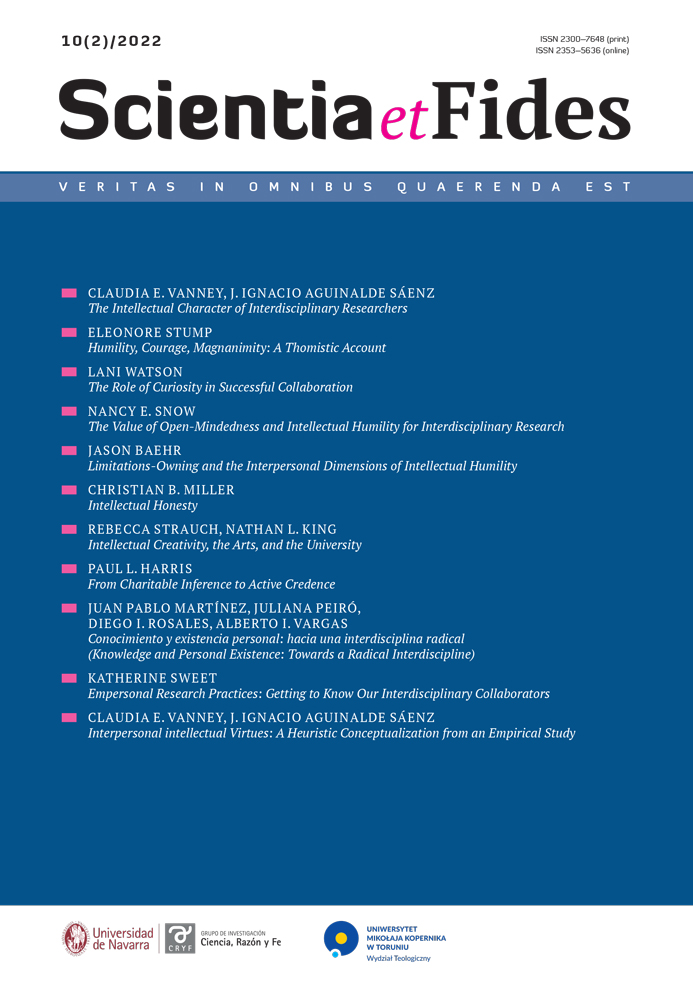Intellectual Honesty
DOI:
https://doi.org/10.12775/SetF.2022.021Keywords
dishonesty, honesty, virtue, motivation, self-deceptionAbstract
Until recently, almost nothing had been written about the moral virtue of honesty in the past 50 years of Western analytic philosophy. Slowly, this is beginning to change. But moral honesty is not the only kind of honesty there is. In this paper, I focus specifically on the intellectual cousin to moral honesty, and offer a preliminary account of its behavioral and motivational dimensions. The account will be centered on not intentionally distorting the facts as the person takes them to be, for one of a variety of intellectually virtuous motivating reasons.
References
Byerly, T. Ryan. Forthcoming. “Intellectual Honesty and Intellectual Transparency.” Episteme.
Fallis, Don. 2018. “What is Deceptive Lying?” in Lying: Language, Knowledge, Ethics, and Politics. Ed. Eliot Michaelson and Andreas Stokke. Oxford: Oxford University Press, 25–42.
Frankfurt, Harry. 1986. “On Bullshit.” Raritan 6. Reprinted in The Importance of What We Care About. Cambridge: Cambridge University Press, 1988, 117–133.
Guenin, Louis. 2005. “Intellectual Honesty.” Synthese 145: 177–232.
King, Nathan. 2021. The Excellent Mind: Intellectual Virtues for Everyday Life. New York: Oxford University Press.
Mele, Alfred. 2001. Self-Deception Unmasked. Princeton: Princeton University Press.
Miller, Christian. 2017. “Honesty,” in Moral Psychology, Volume V: Virtue and Character. Ed. Walter Sinnott-Armstrong and Christian B. Miller. Cambridge: MIT Press, 237–273.
Miller, Christian. 2021. Honesty: The Philosophy and Psychology of a Neglected Virtue. New York: Oxford University Press.
Roberts, Robert and Ryan West. 2020. “The Virtue of Honesty: A Conceptual Exploration,” in Integrity, Honesty, and Truth Seeking. Ed. Christian B. Miller and Ryan West. New York: Oxford University Press, 97–126.
Wilson, Alan. 2017. “Avoiding the Conflation of Moral and Intellectual Virtues.” Ethical Theory and Moral Practice 20: 1037–1050.
Wilson, Alan. 2018. “Honesty as a Virtue.” Metaphilosophy 49: 262–280.
Zagzebski, Linda. 1996. Virtues of the Mind. Cambridge: Cambridge University Press.
Downloads
Published
How to Cite
Issue
Section
License
Copyright (c) 2022 Christian Miller

This work is licensed under a Creative Commons Attribution-NoDerivatives 4.0 International License.
CC BY ND 4.0. The Creator/Contributor is the Licensor, who grants the Licensee a non-exclusive license to use the Work on the fields indicated in the License Agreement.
- The Licensor grants the Licensee a non-exclusive license to use the Work/related rights item specified in § 1 within the following fields: a) recording of Work/related rights item; b) reproduction (multiplication) of Work/related rights item in print and digital technology (e-book, audiobook); c) placing the copies of the multiplied Work/related rights item on the market; d) entering the Work/related rights item to computer memory; e) distribution of the work in electronic version in the open access form on the basis of Creative Commons license (CC BY-ND 3.0) via the digital platform of the Nicolaus Copernicus University Press and file repository of the Nicolaus Copernicus University.
- Usage of the recorded Work by the Licensee within the above fields is not restricted by time, numbers or territory.
- The Licensor grants the license for the Work/related rights item to the Licensee free of charge and for an unspecified period of time.
FULL TEXT License Agreement
Stats
Number of views and downloads: 1628
Number of citations: 0



